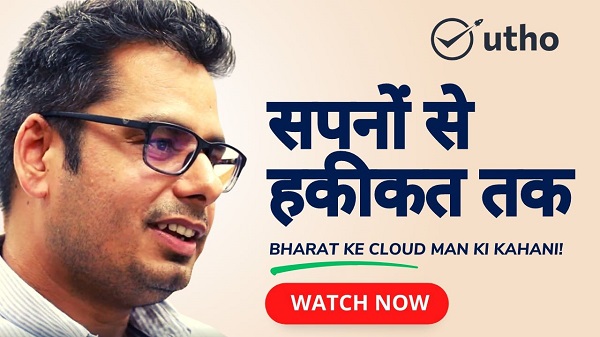Utho, India’s first cloud platform, ignited a new era in the Indian cloud market at the MSP India Summit held in Delhi on 7 July, 2023. Mr. Manoj Dhanda (Founder and CTO – Utho) electrified the audience with his profound insights on propelling India’s digital revolution.
He also facilitated the nation’s growth through the “Make in India” and “Digital India” initiatives.
Watch the Story of 𝐓𝐡𝐞 𝐌𝐚𝐧 𝐁𝐞𝐡𝐢𝐧𝐝 𝐈𝐧𝐝𝐢𝐚’𝐬 𝐅𝐢𝐫𝐬𝐭 𝐂𝐥𝐨𝐮d 𝐏𝐥𝐚𝐭𝐟𝐨𝐫𝐦
Utho emerged as the essence of Indian brilliance and technological excellence, uplifting the audience’s spirits.
Mr. Manoj Dhanda’s captivating presentation showcased Utho’s unwavering commitment to the nation, fueling a surge of enthusiasm amongst the attendees who witnessed firsthand the greatness of an Indian provider revolutionizing the cloud industry.
With unwavering authority, He drew a striking comparison between Utho and hyperscalers. He proved Utho’s superiority in terms of Cost, Simplicity, Support, Reliability, and Customer Service. As the crowd absorbed this remarkable announcement, a wave of appreciation swept through the room, strengthening Utho’s position as the leading leader in the Indian cloud market.
“From the depths of my passion to uplift SMBs across India, I launched Utho, India’s first cloud platform, with a singular vision: to transform their journey through the power of secure, reliable, and affordable cloud solutions,” passionately expressed Mr. Manoj, embodying the spirit of a true Indian entrepreneur dedicated to propelling the nation’s growth.
The event exuded an electric atmosphere as the audience connected with Utho’s resounding impact on Indian businesses.
Thrilled with pride and enthusiasm, attendees were inspired by Utho’s commitment to empowering Indian SMBs, ensuring that their success fuels the progress of the Indian economy.
Utho marks a historic turning point in the Indian cloud market. The platform’s comprehensive suite of cloud solutions, fortified by robust security measures, seamless scalability, and personalized customer support, is tailored to meet the unique demands of Indian businesses.
Utho empowers organizations to unleash their full potential, transforming the way they operate and carving a path toward unparalleled success.
As India’s first cloud platform, Utho is a catalyst for innovation, driving economic growth, and strengthening India’s position as a global technology powerhouse.
The rise of Utho signifies the dawning of a new era, where Indian providers take over new areas and rewrite the narrative of success in the digital space.
About Utho:
Utho is India’s pioneering cloud platform, (formerly known as Microhost) revolutionizing businesses by providing secure, reliable, and affordable cloud solutions. With an unwavering focus on “Make in India” and “Digital India,” Utho empowers organizations to unlock their true potential, contribute to the nation’s growth, and usher in a new era of Indian technological supremacy.



